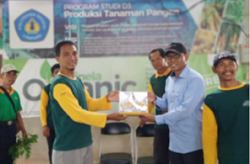Bimbingan Teknis Pertanian Organik sebagai Penerapan Teknologi Budidaya Ramah Lingkungan kepada Perkumpulan Kelompok Tani Gapsera Sejahtera Mandiri Organic Agriculture Technical Guidance as the Application of Environmentally Friendly Cultivation Technology to the Gapsera Sejahtera Mandiri Farmer Group Association
Main Article Content
Abstract
Organic agriculture was a cultivation system that applies the concept of sustainable agriculture. Organic farming systems depend on natural ingredients without using synthetic chemicals. Organic cultivation was environmentally friendly by farming activities by continuing to minimize negative impacts on the surrounding environment. This activity aims to provide knowledge and skills on the concept of sustainable agriculture, which is carried out through the application of an organic farming system at Polinela Organic Farm. Technical guidance activities are carried out at the Polinela Organic Farm, Lampung State Polytechnic, on Tuesday, March 10, 2020. Participants were the Association of ‘Sejahtera Mandiri’ Farmers Groups Rejo Asri Village, Seputuh Raman, Central Lampung. The application of environmental friendly in agricultural aspects was reflected in the management of the concept of organic agriculture carried out by Polinela Organic Farm. The concept of environmental friendly in agricultural development was implemented by taking into various aspects, such as the use of inorganic fertilizers with high efficiency, the application of pest and disease control by notice the natural ecological balance, the application of integrated crop management, the application of a clean and healthy farming system, the maintenance and strengthening of physical fertility, chemical, and biological in nature and the use of effective technology based on local wisdom.
Downloads
Article Details
Authors who publish with this journal agree to the following terms:
- Any article on the copyright is retained by the author(s).
- Author grant the journal, right of first publication with the work simultaneously licensed under a Creative Commons Attribution License that allows others to share work with acknowledgment of the work authors and initial publications in this journal.
- Authors are able to enter into a separate, additional contractual arrangements for non-exclusive distribution of published articles of work (eg, post-institutional repository) or publish it in a book, with acknowledgment of its initial publication in this journal.
- Authors are permitted and encouraged to post their work online (e.g., in institutional repositories or on their websites) prior to and during the submission process, as can lead to productive exchanges, as well as earlier and greater citation of published work.
- The article and any associated published material is distributed under the Creative Commons Attribution-ShareAlike 4.0 International License
References
International Federation of Organic Agriculture Movements. 2020. The Four Pronciples of Organic Agriculture. https://www.ifoam.bio/why-organic/shaping-agriculture/four-principles-organic
Mayrowani, H. 2012. Pengembangan Pertanian Organik Di Indonesia. Forum Penelitian Agro Ekonomi. 30(2):91-108. http://dx.doi.org/10.21082/fae.v30n2.2012.91-108
Purwaningsih, Y. 2008. Ketahanan Pangan: Situasi, Permasalahan, Kebijakan, Dan Pemberdayaan Masyarakat. Jurnal Ekonomi Pembangunan: Kajian Masalah Ekonomi dan Pembangunan. 9(1):1-27. https://doi.org/10.23917/jep.v9i1.1028
Rachma, N., Umam, A.S. 2020. Pertanian Organik Sebagai Solusi Pertanian Berkelanjutan Di Era New Normal. Jurnal Pembelajaran Pemberdayaan Masyarakat (JP2M). 1(4):328-338. http://dx.doi.org/10.33474/jp2m.v1i4.8716
Rivai, R.S., Anugrah, I.S. 2011. Konsep Dan Implementasi Pembangunan Pertanian Berkelanjutan Di Indonesia. Forum Penelitian Agro Ekonomi. 29(1):13-25. http://dx.doi.org/10.21082/fae.v29n1.2011.13-25
Suryana, A. 2014. Menuju Ketahanan Pangan Indonesia Berkelanjutan 2025: Tantangan Dan Penanganannya. Forum Penelitian Agro Ekonomi. 32(2):123-135. http://dx.doi.org/10.21082/fae.v32n2.2014.123-135
Tuhuteru, S., Mahanani, A.U., Rumbiak, R.E.Y. 2019. Pembuatan Pestisida Nabati Untuk Mengendalikan Hama Dan Penyakit Pada Tanaman Sayuran Di Distrik Siepkosi Kabupaten Jayawijaya. Jurnal Pengabdian Kepada Masyarakat. 25(3):135-143. https://doi.org/10.24114/jpkm.v25i3.14806
Wihardjaka, A. 2018. Penerapan Model Pertanian Ramah Lingkungan sebagai Jaminan Perbaikan Kuantitas dan Kualitas Hasil Tanaman Pangan. Pangan. 27(2):155-164. https://doi.org/10.33964/jp.v27i2.376
Winarso, B. 2013. Kebijakan Pengembangan Komoditas Tanaman Pangan dalam Mendukung Program Master Plan Percepatan dan Perluasan Pembangunan Ekonomi Indonesia (MP3EI) Studi Kasus di Propinsi Gorontalo. Jurnal Penelitian Pertanian Terapan. 13(2):85-102. https://doi.org/10.25181/jppt.v13i2.171
